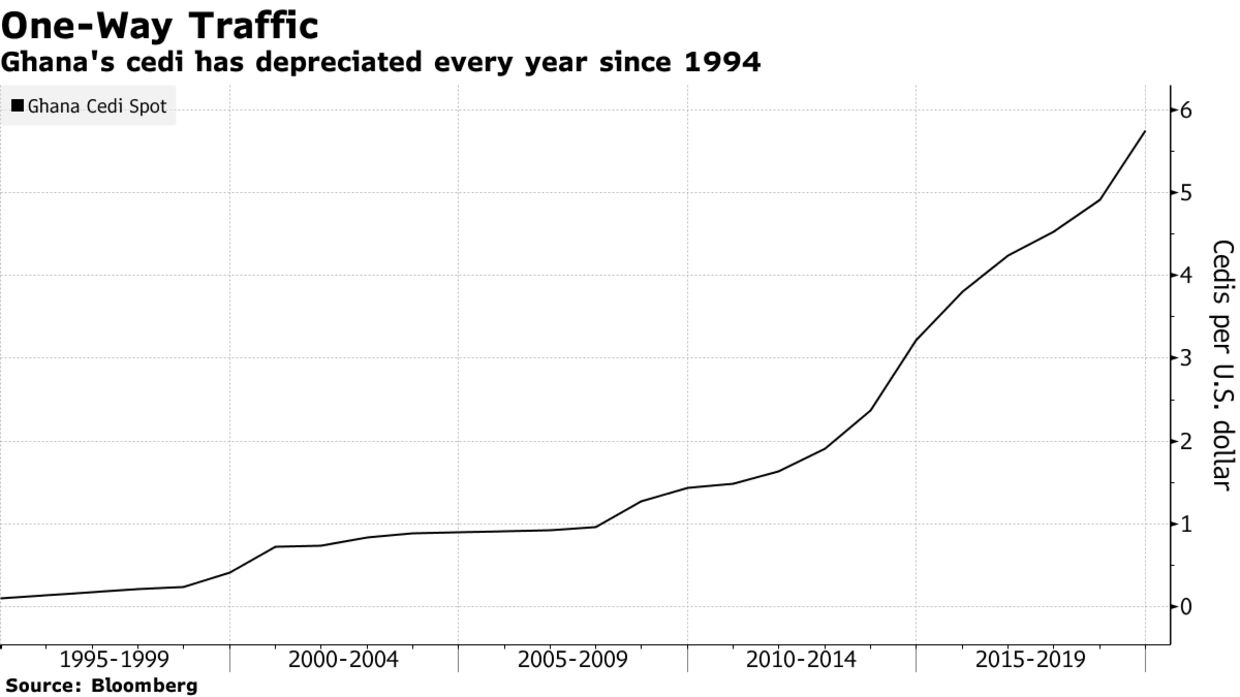 “The overshooting fiscal deficit and debt from arrears is putting pressure on the cedi,” De Hart said by phone. “We have an election coming up next year and portfolio investors are concerned that the plan outlined in the 2020 budget will not be met because revenue continues to underperform.”
Ghana’s budget deficit is forecast to widen to 4.9% of gross domestic product this year, from 4.1% in 2018, according to the median estimate in a Bloomberg survey of economists. The shortfall is rising as the government increases spending to pay for financial-sector bailouts and liabilities in the energy sector.
The central bank’s inability to quickly build foreign reserves due to a deficit in the current account is another source of cedi weakness, De Hart said.
“Even though the trade account is in surplus, the current account is in deficit, impeding the accumulation of foreign reserves,” he said. “Gross reserves have hovered around $8 billion for some time now, which suggests that the central bank has not aggressively intervened to support the currency.”
Ghana adopted the cedi in 1965 to replace the Ghanaian pound, which was equal in value to the British pound and its currency since independence in 1957.
The “new cedi,” worth 1.2 original cedis and about half a British pound, was introduced in 1967. Decades of high inflation led to a redenomination in 2007, when the new cedi was phased out and replaced by the current currency at a ratio of one to 10,000. It has since lost about 80% of its value.
“The overshooting fiscal deficit and debt from arrears is putting pressure on the cedi,” De Hart said by phone. “We have an election coming up next year and portfolio investors are concerned that the plan outlined in the 2020 budget will not be met because revenue continues to underperform.”
Ghana’s budget deficit is forecast to widen to 4.9% of gross domestic product this year, from 4.1% in 2018, according to the median estimate in a Bloomberg survey of economists. The shortfall is rising as the government increases spending to pay for financial-sector bailouts and liabilities in the energy sector.
The central bank’s inability to quickly build foreign reserves due to a deficit in the current account is another source of cedi weakness, De Hart said.
“Even though the trade account is in surplus, the current account is in deficit, impeding the accumulation of foreign reserves,” he said. “Gross reserves have hovered around $8 billion for some time now, which suggests that the central bank has not aggressively intervened to support the currency.”
Ghana adopted the cedi in 1965 to replace the Ghanaian pound, which was equal in value to the British pound and its currency since independence in 1957.
The “new cedi,” worth 1.2 original cedis and about half a British pound, was introduced in 1967. Decades of high inflation led to a redenomination in 2007, when the new cedi was phased out and replaced by the current currency at a ratio of one to 10,000. It has since lost about 80% of its value.
DISCLAIMER: The Views, Comments, Opinions, Contributions and Statements made by Readers and Contributors on this platform do not necessarily represent the views or policy of Multimedia Group Limited.
Latest Stories
-
19 steps for getting over even the most devastating breakup fast
3 hours -
8th Ghana CEO Summit launched with focus on AI transformation, economic diversification
3 hours -
Prof Opoku-Agyemang has not been given a fair appraisal – Ablakwa
4 hours -
Rainstorm wreaks havoc in Keta and Anloga districts, residents count their losses
4 hours -
Global Plastics Treaty negotiations begin in Ottawa as countries converge on phasing out problematic plastic uses
4 hours -
Support energy alternatives adoption to sustain businesses – GUTA tells government
4 hours -
11th DRIF opens in Accra with a call on governments to focus on digital inclusion
4 hours -
Stakeholders outline plans at RE4C Coalition’s General Assembly in Accra
4 hours -
Women Need ‘shock observers’ for active political participation – Ex-Bauchi Assembly Member
4 hours -
2024 polls: Stop fighting over positions in Mahama’s next government – Asiedu Nketiah
4 hours -
Although people may not always listen to the lyrics, there’s still a market for rap in Ghana – E.L.
4 hours -
Passengers appeal to transport operators to officially announce new fares
5 hours -
Damongo: About 400 NPP Members resign over Minister’s alleged meddling in chieftaincy affairs
5 hours -
Next NDC government will pay special attention to women – Naana Opoku-Agyemang
5 hours -
Amerado is singing and it’s good he’s doing that – Lyrical Joe
5 hours

